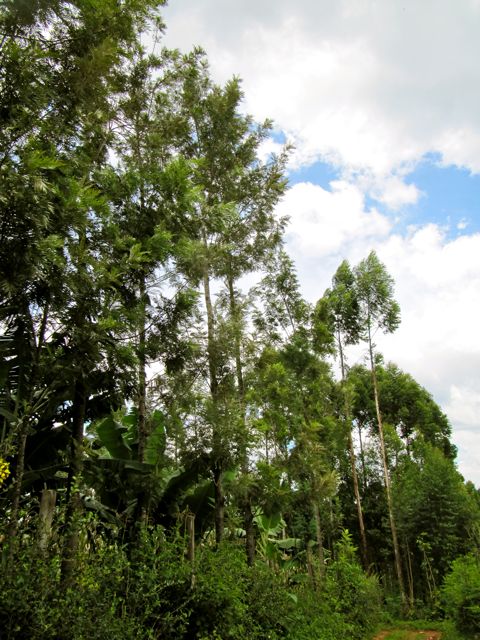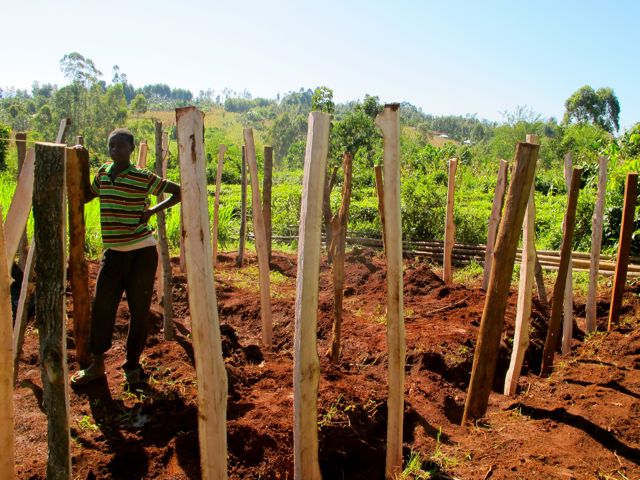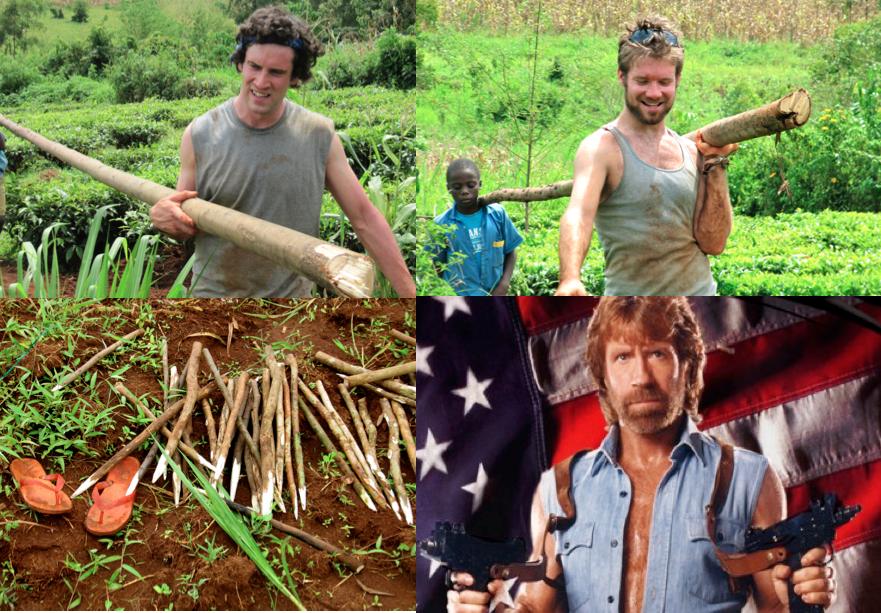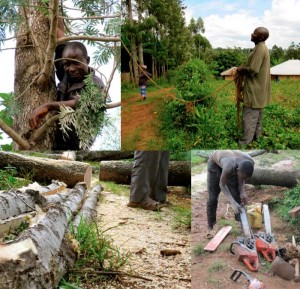
Why To Lend A Hand
It wasn’t our original impetus for coming to Kenya, but after we read Calvin’s email, it became our raison d’être for being here. Calvin, had come across three AIDS orphans (Wilfred [17], Samuel [15] and Simon [13]) a half-kilometer from where he and his brothers had been orphaned by the same cause.
These three brothers were being looked after by their grandparents, who gave all they could to them, which amounted to a place to sleep and a meal a day, not enough to keep them in school.
Calvin’s email rallied the troops as it were. Everyone in our family got on fundraising horn. My dad got on the radio, my mom wrote, my brother John gave away his Christmas money and enough was directed to Bismarck Diocesan mission to build the orphans a house and see to it that they’d have enough to stay in school. That’s the most valuable lesson my parents have instilled in us: When someone needs your help, you help them. You don’t ask why, you don’t make excuses for why you’re not in a position to help, you just figure out a way and you just do it. I think Nike stole their slogan from them.

Trees that Tell Time
Yesterday we started construction on that house. We got an early start on the day, with Calvin, Roger, Tyler and I downing coffee and fry bread just as the sun started hinting at the afternoon heat it was about to unleash. As breakfast was conclusing Roger pointed to the bracelets on Tyler’s wrist, “Here people wear those to protect themselves from witchcraft.”
As we walked to the building site Calvin signaled a row of trees reaching 50 feet ito the air. “I planted those just before I came to the states,” he told us. They are the physical marker of passing time. Other markers, less materially dramatic, tell the story of how that time was spent. They include Calvin and Joash’s diploma’s from Saint Mary’s Central High School, Calvin’s four year college degree, Joash’s NCAA track and cross country trophies, and much more. Maybe most dramatic among them is Calvin’s return here, no longer one asking for help, but seeking those in need of it.
As those trees grew, invisible to the fleeting perception of human eyes, Roger’s family was growing, a mud hut was being left for a two story house, and surviving made way for thriving.
As I jot these words down on a scrap of paper, Roger’s kids are jumping rope and laughing while Calvin (bad influence that he is) is teaching the little one, Joseph, to say, “Luke, I am your father,” something all Lukes are cursed to hear weekly throughout the course of their lives. Not even in Africa can I escape it.
A Tree’s Death Sentence
Underneath a sun that managed to burn despite the 50 SPF sunblock that was “gentle enough for a baby,” we broke ground with three Kenyan builders on small piece of and left to the three boys by their parents. “They better do well in school,” Calvin said, “Because they aren’t going to be able to feed themselves with this tiny piee of land.”
First we cleared the Nepi grass, which was bundled and slated for some lucky cow. Then we measured 18’ x 20’ plot, marking off a spot for the two doors.
On such a small structure, two doors might seem wholly unnecessary, and it is, but tradition supersedes practicality. In Kisii (and other tribe’s) tradition, the second door is set aside for use by the elders. It’s built to face the cows and don’t even think about using it without some gray hairs and the accumulated wisdom to boot.

After the grass was cleared we dug a one-foot trench on the house’s boarder and then 60 two-foot holes where the support poles would be placed. As we dug, Roger was half a kilometer away, bargaining for a good price for those poles, which, at that moment, were still trees in the ground, listening, as it were, as a price was placed on their trunks.
Midway through our digging, we broke for a cup of basaa, a fermented corn porridge having the alcohol content of beer. This was the same mix my brother Joash used to drink before school, clandestinely trading the family corn for it.
As we enjoyed a cuppa basaa, one of the workers said I looked like Chuck Norris, and I told him that was the nicest complement I’d ever received. I can’t help it, but now I want to roundhouse kick every chicken I see crossing the road.
Our digging done, we carried the newly fallen trees, over a cornfield, by an irrigated pond where someone was rearing tilapia, past bushes of tea leaves to the building site.

The final task of the day involved waiting for a man with a chainsaw to arrive. He was on Swahili time, so there was nothing to do but wait. When he arrived, a man climbed a tree with a 3-foot diameter at the stump and tied it off at the top. We formed a line and pulled the rope as he sawed so that the tree would fall where we directed it.
the rope as he sawed so that the tree would fall where we directed it.
The work of the day done, feeling a satisfied soreness, we retreated to our room. Calvin watched a documentary, Tyler napped, and I continued reading Tom Robbin’s Skinny Legs and All. After I woke up with the book on my chest, it turned out I opted for a nap too.
Later that day, we’d meet Samuel, Simon, and Wilfred, which was as dramatic an experience as I one as, and not something I’m quite ready to write about yet. It’s late here, and tomorrow we’re waking up early to go to Kusumo, where irregularities in the primary voting today should make for an interesting experience. “Don’t be stupid,” Calvin told me tonight at dinner, which means, “act like a normal tourist; don’t interview people about the elections.” I’ll do my best.




